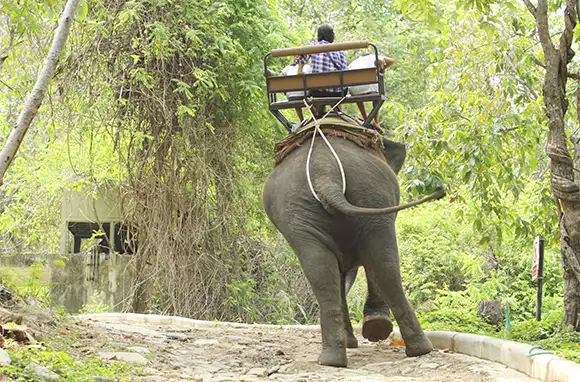
When we travel, we face moral dilemmas small (should we have housekeeping replace our towels every day) and large (should we even go to this debated destinations). Debating ethics with yourself in the moment can be overwhelming, so here’s a helpful primer with expert advice about what to do when confronted with everything from children begging to menus full of exotic meats.
Image Gallery

Give to Panhandlers
Places like India are sadly notorious for high numbers of panhandlers—especially children—in tourist areas. It feels cruel to say no to someone who seems so helpless and is asking you for a little handout. Unfortunately, giving one-off cash donations to people on the streets can be more destructive than helpful.
This Slate article offers a great explanation of why giving on the streets isn't the best course of action for tourists. Jillian Keenan writes: "Many travelers already know that when we give money (or gifts that can be resold, such as pens), we perpetuate a cycle of poverty and give children a strong incentive to stay out of school. You also may already know that giving candy to children in some areas of the world actually causes enormous suffering, since many communities do not have the resources to treat tooth decay. But the reasons to never, ever give to child beggars go much deeper than that. Organized begging is one of the most visible forms of human trafficking—and it's largely financed and enabled by good-hearted people who just want to help." Instead of giving to panhandlers, donate to charities that work to break the cycle of poverty and directly help people in the country you're visiting.

Give to Panhandlers
Places like India are sadly notorious for high numbers of panhandlers—especially children—in tourist areas. It feels cruel to say no to someone who seems so helpless and is asking you for a little handout. Unfortunately, giving one-off cash donations to people on the streets can be more destructive than helpful.
This Slate article offers a great explanation of why giving on the streets isn't the best course of action for tourists. Jillian Keenan writes: "Many travelers already know that when we give money (or gifts that can be resold, such as pens), we perpetuate a cycle of poverty and give children a strong incentive to stay out of school. You also may already know that giving candy to children in some areas of the world actually causes enormous suffering, since many communities do not have the resources to treat tooth decay. But the reasons to never, ever give to child beggars go much deeper than that. Organized begging is one of the most visible forms of human trafficking—and it's largely financed and enabled by good-hearted people who just want to help." Instead of giving to panhandlers, donate to charities that work to break the cycle of poverty and directly help people in the country you're visiting.

Visit Endangered Destinations
There are so many places that travel sites (ourselves included) implore you to "see before they're gone," but what if by visiting them, you're speeding up their demise? Places like Machu Picchu, for example, are slowly being eroded by the hundreds of thousands of people who visit the ancient site every year. By treading these well-traveled paths, you're contributing to their ruin. So if you go, make sure you're doing it in a responsible way.
As the old saying goes: "take nothing but pictures, leave nothing but footprints." Treat these places with respect—don't go off of marked paths, definitely don't litter, and don't take any stones or plants with you as a souvenir. If you can, donate to foundations dedicated to helping maintain and restore the sites you visit, and if you're traveling with a tour group, make sure you go with one that practices sustainable tourism and gives back to local communities.

Haggle
I get it—you don't want to be ripped off when you travel. We all know there's a different price at markets for locals and tourists, and many people think that haggling is part of a culture, and that the seller would be offended if you didn't try to knock a few dollars off the price. But don't forget: Although a few extra dollars may mean an extra latte to you, it could be half a day's wages for the person you're bargaining with.
Ethical tourism campaign Tourism Concern offers a good guideline: "Tourists sometimes feel that the need to drive a hard bargain, but local people need to make a living so people should expect to pay a fair price —not the lowest possible. Haggle too hard and you could cause real suffering to traders already living hand-to-mouth."

Animal Attractions
Even Sea World has finally caught on that keeping animals captive for our entertainment isn't right (it's phasing out the orcas in its parks). But what about those attractions that seem harmless? Around the world, you can find places to swim with dolphins, ride an elephant, or even pet a tiger. It looks fun, and imagine the cool pictures, right? The fact is, taking animals out of their natural habitats and forcing them to entertain tourists is simply cruel. Not convinced? Just read this report from World Animal Protection on the World's Cruelest Attractions. Elephant riding? The elephants only let tourists on their backs because "they are taken from their mothers when babies and forced through a horrific training process known as 'the crush'. Typically, they are restrained in a small cage, beaten and abused until their spirits are broken so that they will accept a person riding on their back or other direct contact between tourists and elephants."
Swimming with dolphins? "Many performing dolphins around the world are still captured in the wild. They are often chased by high-speed boats before being hauled on board or caught in nets. For many, the stress is too much to take and they die during transportation to their intended destinations … they face a lifetime of suffering. They spend their entire lives in a space not much bigger than a swimming pool—completely unnatural and restrictive compared to their natural open sea environment." Tiger selfies? "Tiger cubs are separated from their mothers at an early age so they can be used as photo props for hours on end. They are handled and hugged by tourists and typically kept chained or in small cages with concrete floors."
Take your money to animal sanctuaries, rehabilitation centers, or wild safaris instead, where you can see animals in their natural element, and where they are being helped (not hurt) by humans. And remember to do your research—many of these animal attractions claim they don't abuse animals, but tourists don't see what really goes on behind the scenes, so don't rely on online reviews. The Global Federation of Animal Sanctuaries has a good guide to help you fact-check.
RELATED: Please Do Not Participate in These Cruel Activities on Vacation

Slum Tours
Unbelievably, "slum tourism" has become a trend lately, where comparatively well-off tourists pay to visit poverty stricken areas like the favelas of Rio de Janeiro. Critics argue that this is treating the inhabitants like animals in a zoo, and is deeply unethical.
Supporters say the tours usually employ residents and can help bring money into the communities. If you are going to participate in one, make it more ethical by doing your research to make sure that the profits from the tour are going back into the neighborhood you're visiting. Look for companies run by local residents and those that give to charities. Be considerate and respectful of the people living there—don't take anyone's photo without permission, dress according to local norms (for instance, by wearing modest clothing if that's the standard), and tip well.

Eat Exotic Delicacies
Part of the whole travel experience is getting to sample delicacies you've never tried before. Some of these foreign foods may seem weird to you, but eating them is part of the adventure, right? What about dishes that are illegal to eat in the U.S—should you eat them when you're abroad, just because you can? Consider whales for instance—commercial whaling is banned by the United Nations in an effort to protect endangered species, but countries such as Iceland and Japan defy the ruling, and you can find whale meat and blubber on menus in both countries.
Personally, I'd rather go on a whale watching tour than eat such a majestic creature, so I say, leave the endangered meats off the table and help ensure these species will be around for future generations to see. You might think that one taste won't do any harm, but you're voting with your money by helping to support these industries when you buy banned, threatened, or endangered delicacies.

Reuse Hotel Towels
It's easy to dismiss the little card in the hotel bathroom that implores you to "hang up your towels if you wish to reuse them" (purportedly for the sake of the environment) as a way for the company to save some money. Plus, you're on vacation, and a nice fresh towel every day is part of the luxury that you don't get at home.
So will it make a difference if you alone don't reuse your towels for a weekend vacation? Not really. But if all (or at least most) hotel guests opted to reuse towels during their stay, it would save a lot of water and significantly reduce the environmental footprint of travel. According to a report by the EPA, laundry accounts for the 16 percent of hotels' water usage, a big number when you consider that hotels use 17 percent of America's public water supplies. I vote: reuse your towel and do your part for the environment. And hotels can do their part by installing more hooks and racks in the bathrooms so that more than one guest can hang towels between uses.

Giving up your Seat for a Worse One
The scenario: You got to the airport early, paid for extra legroom, or logged on to the airline website the minute that check-in opened, and your efforts paid off—you got the seat that you wanted. But, once you're sitting in that sweet seat, a family who couldn't get seated together boards and wants you to switch so they can all sit together. Should you move? What if the seat they want you to take is a worse one—like trading a window for a middle, or moving towards the back of the plane when you want to be in the front?
I think that if you're being asked to move to a worse seat, you shouldn't feel guilty about saying no. The people asking for the displacement should try to trade with people who have worse seats than them, so that everyone wins.
More from SmarterTravel:
- 10 Surprising Ways to Offend People in Other Countries
- 7 Signs You're an 'Ugly American' Tourist
- 10 Innocent Gestures You Shouldn't Use Overseas
Caroline Morse is a Senior Editor with SmarterTravel. Follow her on Instagram @TravelWithCaroline and on Twitter @CarolineMorse1.
We hand-pick everything we recommend and select items through testing and reviews. Some products are sent to us free of charge with no incentive to offer a favorable review. We offer our unbiased opinions and do not accept compensation to review products. All items are in stock and prices are accurate at the time of publication. If you buy something through our links, we may earn a commission.
Related
Top Fares From
Today's Top Travel Deals
Brought to you by ShermansTravel
Shop and Save with Country Inns...
Patricia Magaña
 Hotel & Lodging Deals
Hotel & Lodging Deals
$229 -- Chicago: Discounted Rates and...
Francesca Miele
 Hotel & Lodging Deals
$229+
Hotel & Lodging Deals
$229+
$188 -- Honolulu: Save on Oceanview...
Abigail Lamay
 Hotel & Lodging Deals
$188+
Hotel & Lodging Deals
$188+



